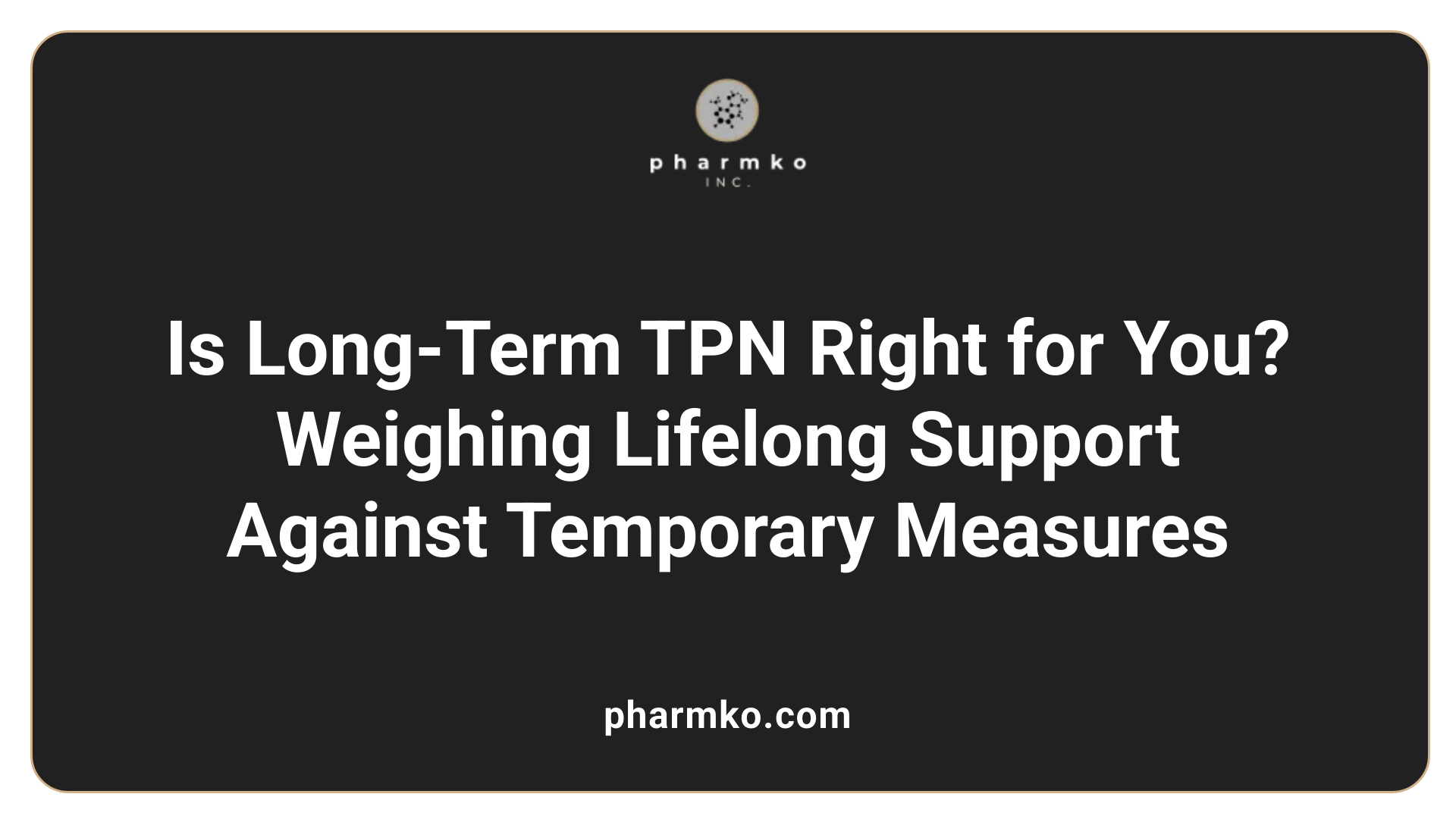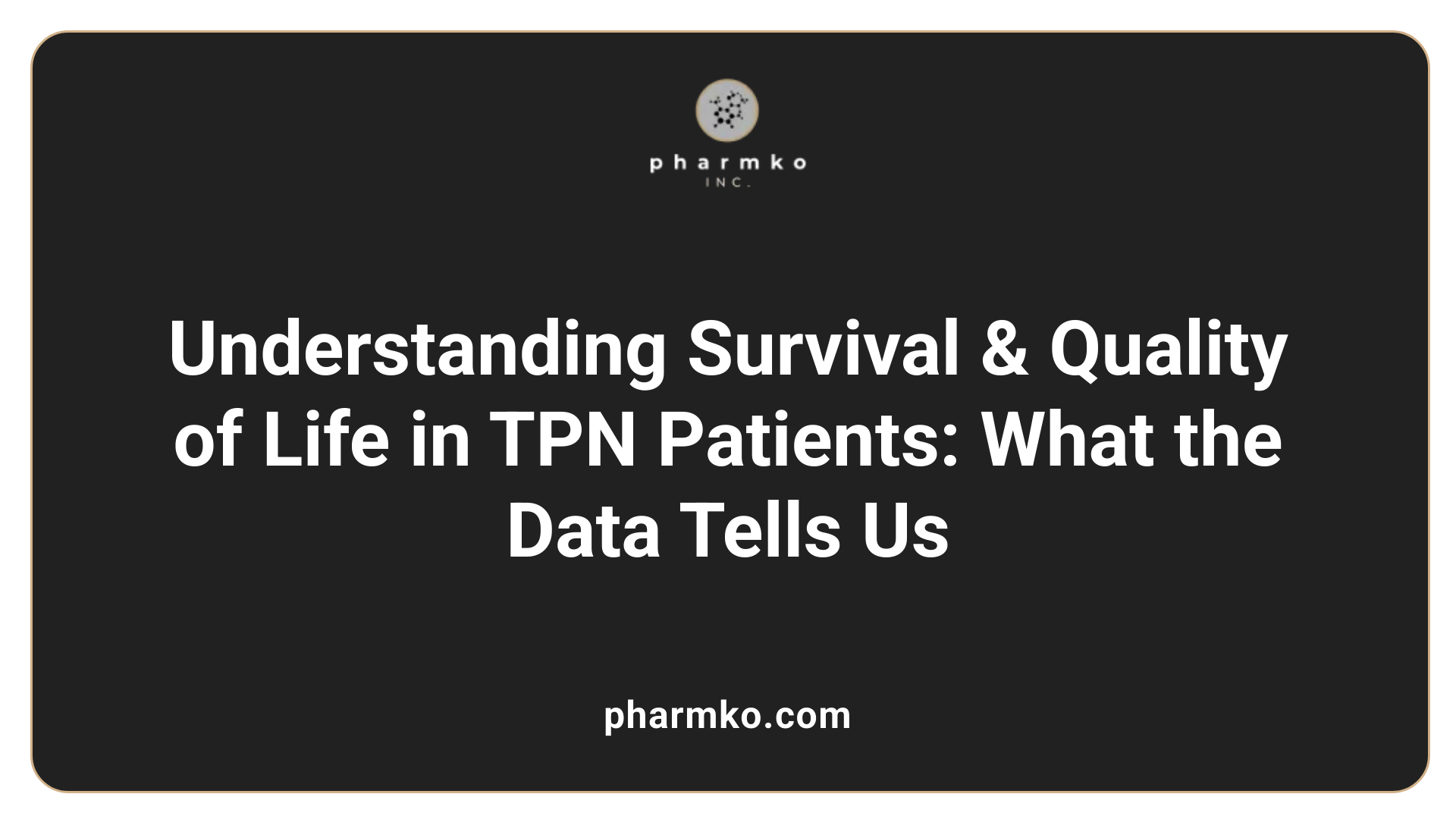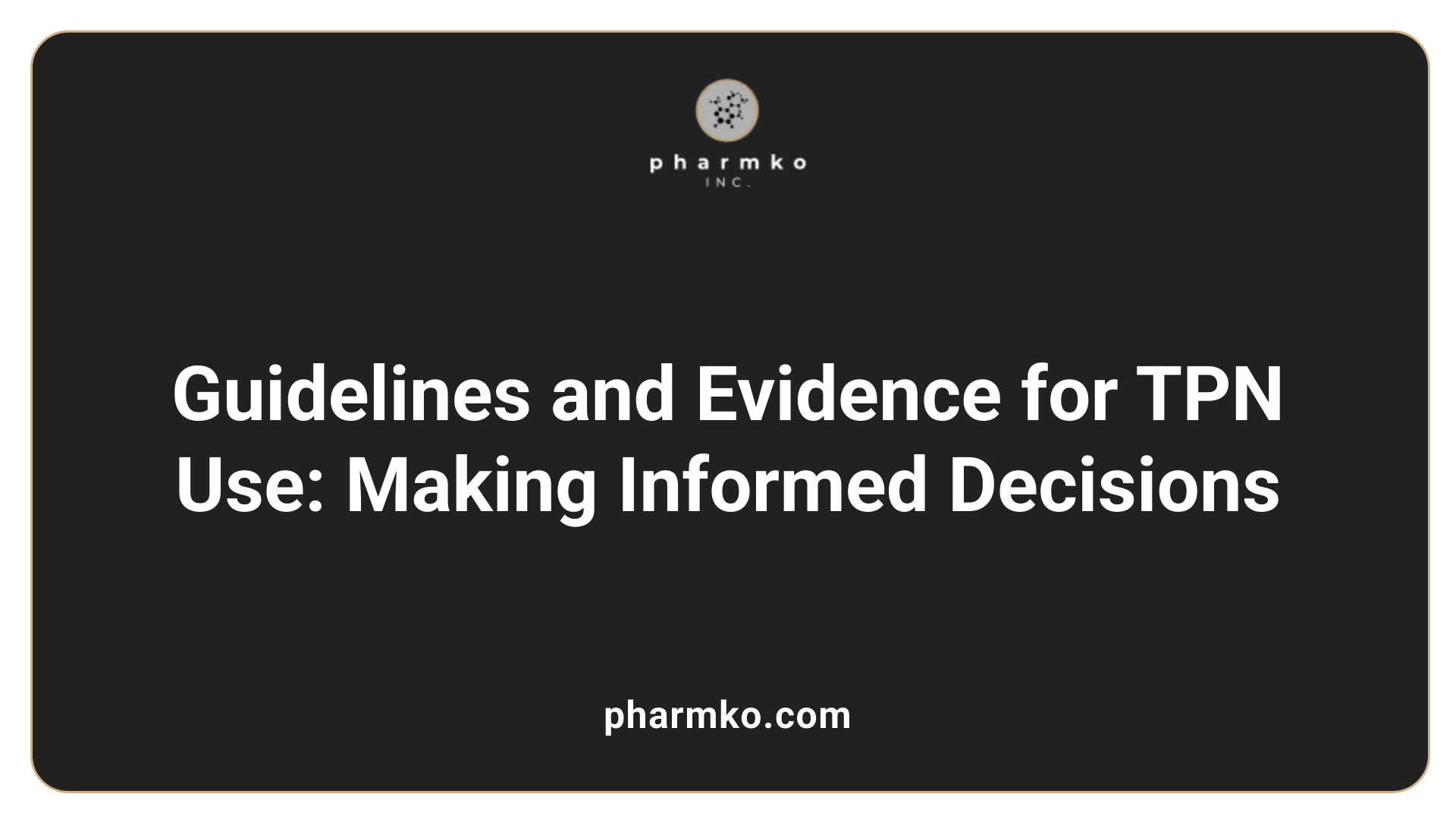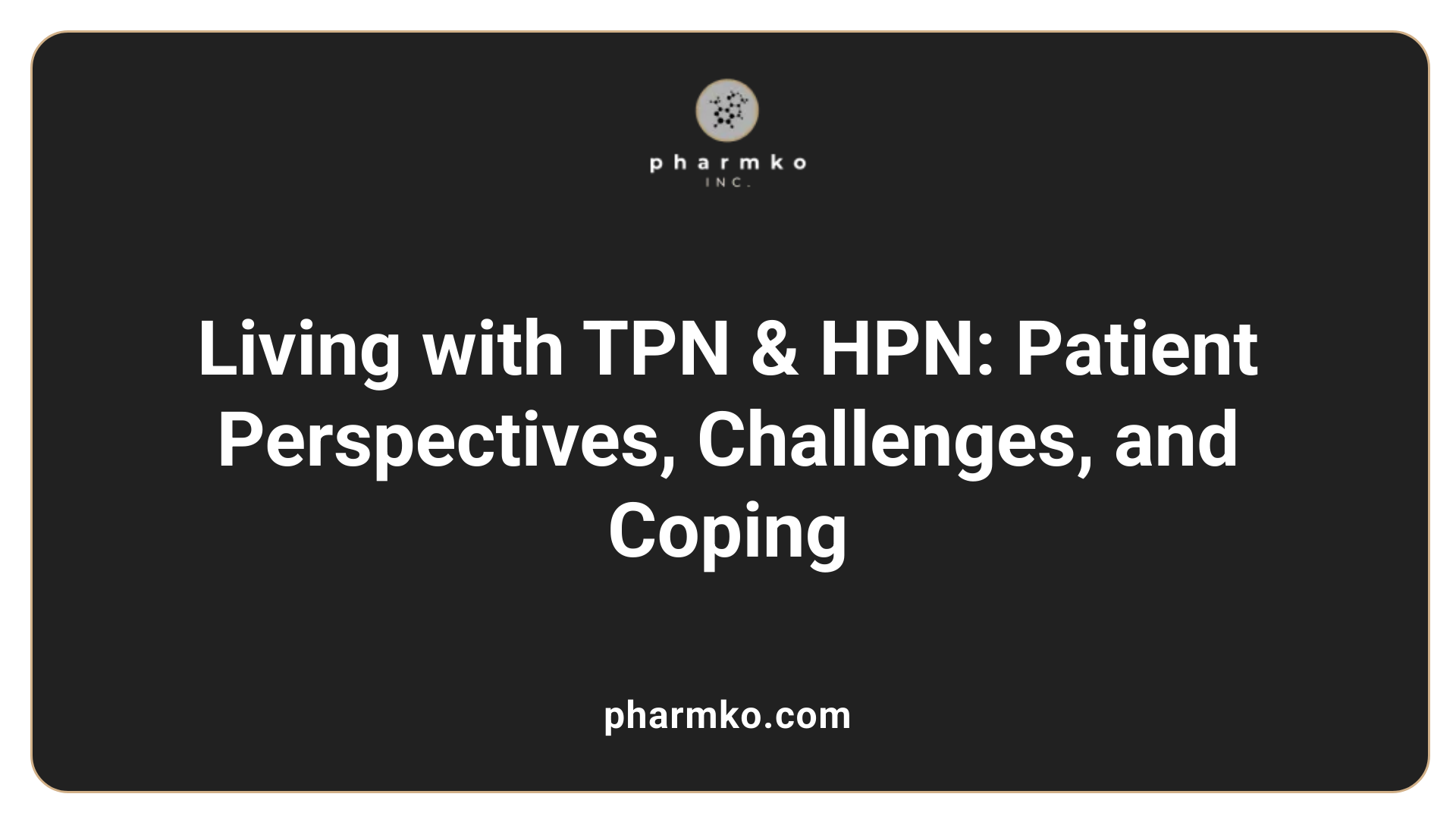The Impact of TPN on Quality of Life for Chronically Ill Patients
Understanding the Role of TPN in Long-Term Care
Total Parenteral Nutrition (TPN) is a complex, life-sustaining therapy used for patients with severe gastrointestinal dysfunction or advanced cancer, where oral or enteral feeding is impossible or insufficient. Its impact on quality of life, survival, and complications warrants careful consideration, particularly in chronically ill populations. This article explores the benefits, risks, and long-term implications of TPN, alongside the psychosocial experiences of patients and recent clinical research findings.
Long-term Use of TPN: Lifelong Support or Temporary Measure?

Can you stay on TPN for life?
Yes, it is possible to remain on total parenteral nutrition (TPN) for life, particularly for individuals whose gastrointestinal systems are unable to process or absorb nutrients effectively. Conditions such as short bowel syndrome, severe Crohn’s disease, radiation enteritis, or other irreversible gastrointestinal disorders may necessitate lifelong TPN to sustain vital nutritional needs.
TPN delivers complete nutrition directly into the bloodstream, bypassing the digestive system entirely. This intravenous approach is carefully tailored to meet each patient's specific energy and nutrient requirements, which are monitored through regular laboratory assessments.
Despite its life-sustaining potential, long-term TPN is not without risks. Common complications include bloodstream infections (related to central venous catheters), liver dysfunction, and metabolic disturbances like abnormal blood sugar levels. Because of these risks, meticulous management and ongoing medical monitoring are critical to optimize outcomes and reduce adverse effects.
In some cases, if the underlying gastrointestinal condition improves, patients might transition off TPN, possibly moving to enteral or oral feeding. However, for many with irreversible gastrointestinal failure, TPN remains an essential, lifelong therapy.
While it involves significant commitment and potential complications, long-term TPN can be a vital option that maintains quality of life and prolongs survival when no other nutritional support options are feasible. The decision to continue lifelong TPN should involve thorough evaluation of risks and benefits, in collaboration with a multidisciplinary healthcare team.
Evaluating Survival and Quality of Life Outcomes in TPN Patients
 Patients receiving total parenteral nutrition (TPN) exhibit a broad range of survival times, largely influenced by their underlying health and specific conditions. In terminal cancer patients, particularly those with ovarian cancer experiencing intestinal obstruction, median survival after initiating TPN hovers around 70 to 72 days. However, survival rates are markedly shorter in cases involving gastrointestinal cancers, with some studies showing overall median survival of approximately 70 days, and even shorter timelines when complications or disease burden are high.
Patients receiving total parenteral nutrition (TPN) exhibit a broad range of survival times, largely influenced by their underlying health and specific conditions. In terminal cancer patients, particularly those with ovarian cancer experiencing intestinal obstruction, median survival after initiating TPN hovers around 70 to 72 days. However, survival rates are markedly shorter in cases involving gastrointestinal cancers, with some studies showing overall median survival of approximately 70 days, and even shorter timelines when complications or disease burden are high.
The tendency to live several years on TPN is more common in patients with chronic intestinal failure rather than advanced cancer. For example, some patients with stable gastrointestinal conditions and careful management can survive 3 years or more, with multicenter data indicating approximately 65 to 80% survive 3 years, and around 64% reaching 5 years. Nevertheless, in the context of incurable gastrointestinal diseases or end-stage cancer, long-term survival is less common due to risks such as infections, liver issues, and metabolic disturbances.
Several factors influence how long a patient might benefit from TPN. Key among them are the severity of the disease, presence of complications like infections, and overall functional status. Prognostication tools, such as the Karnofsky Performance Status score and Glasgow Prognostic Score, can help estimate likely survival and guide decisions regarding TPN use.
The impact of TPN on quality of life is complex. While some patients report improvements in nutritional status and physical strength, the majority do not experience a significant enhancement in overall well-being. Frequent complications such as infections and liver dysfunction can diminish quality of life, often offsetting the nutritional benefits. In palliative settings, TPN’s benefit regarding symptom relief and life extension remains controversial, especially considering the potential for adverse effects.
Ultimately, the decision to initiate or continue TPN requires a careful balance. It involves considering the patient’s prognosis, potential risks, and the realistic benefits to quality of life. Close clinical monitoring and individualized treatment plans are essential, with a focus on patient-centered goals rather than solely on prolongation of survival.
Clinical Evidence and Expert Guidelines on TPN Use

Is TPN for end-of-life care?
Total parenteral nutrition (TPN) is often considered in end-of-life settings, especially for patients with advanced cancer experiencing severe malnutrition or bowel obstruction. It can help maintain some nutritional intake when enteral feeding is impossible. However, its benefits in improving quality of life or survival among terminally ill cancer patients are limited.
Studies indicate that TPN may provide a short-term median survival benefit of around four weeks, but this advantage diminishes with concurrent chemotherapy or disease progression. Moreover, the impact on quality of life is generally minimal, with many patients experiencing no significant improvement or even decline.
The American College of Physicians discourages the routine use of artificial nutrition, including TPN, in terminally ill cancer patients. They emphasize that decisions should be individualized, considering patient wishes, prognosis, and potential burdens like complications and discomfort.
While TPN can serve as a supportive measure, clinicians need to evaluate whether it aligns with the patient's goals of care, particularly in the context of limited life expectancy.
Research on TPN benefits and drawbacks
Research shows that TPN may transiently improve health-related quality of life (HRQoL) and physical function, especially when enteral nutrition isn't feasible. Nonetheless, evidence supporting its widespread use remains weak, mainly derived from observational studies. TPN does not outperform simple fluid therapy or dietary counseling in prolonging survival for terminal patients.
A notable concern is the high complication rate associated with TPN, including infections, thrombosis, and liver dysfunction. For example, one study reported a 68% readmission rate due to TPN-related issues. Such risks require careful monitoring and make TPN less suitable for routine use at end of life.
In ICU settings, early nutritional support using parenteral nutrition, when indicated, shows some benefits like shorter hospital stays, but overfeeding or unindicated use can cause adverse effects, including hyperglycaemia and infections.
Guidelines for appropriate TPN initiation and monitoring
Guidelines recommend starting TPN cautiously—ideally between 24 and 72 hours after ICU admission when enteral nutrition isn't sufficient. Before initiation, thorough nutritional assessment and prognostic tools such as the Karnofsky Performance Status or Glasgow Prognostic Score should guide decision-making.
Monitoring includes tracking energy expenditure through indirect calorimetry, assessing body composition, and watching for complications like infections or liver issues. Overfeeding must be avoided, as it can exacerbate metabolic disturbances.
TPN is generally indicated in cases of malignant bowel obstruction, cachexia, or severe malabsorption, especially when other options have been exhausted. Its primary goals are to sustain nutritional status and improve quality of life where feasible.
Risks associated with TPN
TPN is linked to several risks, notably infections (due to central venous access), thrombosis, and hepatobiliary dysfunction. The complication rate is high, with significant numbers of patients requiring readmission or experiencing adverse effects.
In palliative settings, the decision to initiate or continue TPN must consider disease progression, patient comfort, and potential burdens. Discontinuation decisions should be supported by careful discussion with patients and families, emphasizing compassion and holistic care.
| Aspect | Details | Additional Notes |
|---|---|---|
| Main Risks | Infections, thrombosis, liver dysfunction | Require close monitoring |
| Benefits | Temporary survival extension, potential HRQoL support | Weak evidence, benefits limited |
| Recommendations | Use cautiously, after thorough assessment | Consider patient preferences and prognosis |
| Alternatives | Fluids, dietary counseling | Less invasive, no risks of TPN-related complications |
| Special Conditions | Bowel obstruction, cachexia | Only after exhausting other options |
Overall, while TPN can be a life-supporting therapy under certain circumstances, its routine use in end-stage cancer remains controversial, and cautious, individualized application aligned with patient goals is essential.
Patient Experiences and Psychosocial Aspects of TPN and HPN

What is the patient perspective on long-term TPN and HPN?
Patients and caregivers often see Home Parenteral Nutrition (HPN) as a life-saving intervention that helps sustain life and maintain a sense of normalcy despite its invasive nature. Qualitative research shows that many patients try to normalize their lives by integrating TPN and HPN routines into their daily activities.
Acceptance involves adjusting to the changes, establishing consistent routines, and focusing on what they can do rather than their limitations. This approach helps foster a mindset of resilience and adaptation.
Most patients report a moderate to good quality of life, emphasizing the importance of social connections and psychological support. However, they may face significant physical challenges, including fears of infections, dependence on medical devices, fatigue, and discomfort.
Social restrictions caused by the need for venous access and infusion schedules can affect their social life and emotional well-being. Despite these difficulties, patients often find comfort and strength through support groups, peer interactions, and a strong healthcare team.
Dealing with psychological issues such as depression and anxiety is common, but many patients develop coping strategies that help them maintain hope and a positive outlook.
Ultimately, most patients adapt successfully by weaving TPN and HPN into their lives, focusing on what they can accomplish, and receiving ongoing support. This process of normalization allows them to preserve their dignity and improve their overall quality of life, despite the physical and social barriers they encounter.
| Aspect | Challenges | Coping Strategies & Support |
|---|---|---|
| Physical health | Infection fears, fatigue, discomfort | Medical supervision, peer support, routine care |
| Emotional well-being | Depression, anxiety, fear of dependence | Counseling, support groups, psychological support |
| Social life | Social isolation, inability to participate fully in social activities | Peer interactions, family support, social planning |
| Overall adaptation | Balancing treatment with daily life, preserving normalcy | Establishing routines, acceptance, focusing on strengths |
Understanding the lived experiences of patients on long-term TPN and HPN underlines the importance of holistic care that addresses not only physiological needs but also emotional and social well-being.
Navigating the Complexities of TPN in Chronic Illness
While TPN offers vital nutritional support and life extension in certain chronic and terminal conditions, its long-term use involves significant risks, management challenges, and psychosocial impacts. Decisions around initiating or continuing TPN should be individualized, weighing potential benefits against the possible deterioration in quality of life and complications. Advances in clinical monitoring, interdisciplinary care, and supportive services can help optimize outcomes, enabling patients to maintain dignity and comfort. Ultimately, the goal remains to align treatment strategies with patients’ values and wishes, ensuring their well-being and sense of normalcy amid health challenges.
References
- The effect of total parenteral nutrition on the survival of terminally ill ...
- Use of TPN in terminally ill cancer patients - ScienceDirect.com
- Effects of current parenteral nutrition treatment on health-related ...
- Total parenteral nutrition for patients with gastrointestinal cancers
- The Impact of Long-Term Home Parenteral Nutrition on the Patient ...
- The impact of home parenteral nutrition on daily life - A review
- A randomized trial of supplemental parenteral nutrition in ...
- Use of total parenteral nutrition (TPN) in terminally ill gastrointestinal ...
- Parenteral nutrition in the intensive care unit: cautious use improves ...













